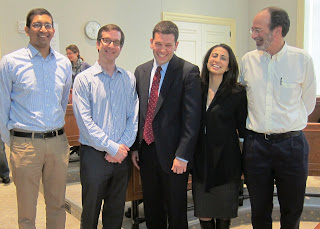"After nearly six hours of emotional debate, a proposed constitutional amendment that would define marriage as between a man and a woman was approved in the Minnesota House late Saturday night. It was the last legislative step needed to put the question on the statewide ballot in November 2012.
"State law already prohibits gay marriage, but supporters of the proposed amendment said it's necessary to prevent judges or lawmakers from legalizing it in the future. Opponents said the constitution should be used to expand rights, not limit them, and predicted a long, divisive debate over the next 18 months.
"The House voted 70-62 mostly along party lines in the GOP-controlled chamber, though four Republicans crossed over to vote 'no' while two Democrats voted in favor of the ban."
********
Meanwhile in New York, Donors to G.O.P. Are Backing Gay Marriage Push
"The newly recruited donors argue that permitting same-sex marriage is consistent with conservative principles of personal liberty and small government."
***********
Mercenaries in the UAE: Secret Desert Force Set Up by Blackwater’s Founder
"In outsourcing critical parts of their defense to mercenaries — the soldiers of choice for medieval kings, Italian Renaissance dukes and African dictators — the Emiratis have begun a new era in the boom in wartime contracting that began after the Sept. 11, 2001, attacks. And by relying on a force largely created by Americans, they have introduced a volatile element in an already combustible region where the United States is widely viewed with suspicion.
...
"Still, it is not clear whether the project has the United States’ official blessing. Legal experts and government officials said some of those involved with the battalion might be breaking federal laws that prohibit American citizens from training foreign troops if they did not secure a license from the State Department."
************
Switzerland: Zurich votes on 'suicide tourism' laws
"While opinion polls indicate a majority of Swiss remain in favour of assisted suicide, they also suggest that 66% are against what has become known as suicide tourism."
In the end, Zurich Voters Keep 'Suicide Tourism' Alive
"Voters in the Swiss canton (state) of Zurich have rejected calls to ban assisted suicide or to outlaw the practice for nonresidents."
***********
Selling Educational 'Indulgences' in the U.K. (HT Kim Krawiec)
"A fierce debate is raging in the U.K. about a new proposal to let wealthy students pay for places at top universities -- even if they've been rejected through the regular admissions process. As it stands now, British universities have firm quotas for the number of students they can admit, and those places are filled through meritocratic competition. Once you get in, you pay a low, flat fee to attend (about $6,000 a year to attend Oxford). But David Willets, the education minister, is proposing to create new, "off-quota" places, open to students who haven't made the cut, as long as they can afford to pay substantially higher fees. Rage and confusion have been the immediate results of his proposal."





